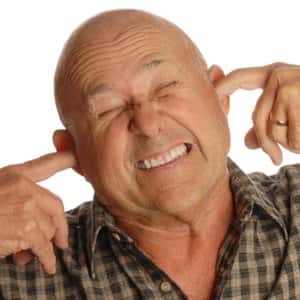
Can you imagine anything more annoying than hearing a mosquito buzzing around your head and not being able to catch it? A dentist’s drill might be a close match. Now imagine what it would be like to have crickets chirping in your ear 24 hours a day, 7 days a week.
Experts estimate that more than 30 million Americans hear a constant noise in their ears. Roughly one in eight men between the ages of 65 and 74 experiences some form of tinnitus (pronounced TIN-a-tus or tin-EYE-tus). Women and children are not spared the unwanted sound effects, which some describe as hissing, humming, chirping, whooshing, whistling, squeaking, or roaring.
Many tinnitus sufferers hear a high-pitched ringing, while others say it sounds more like steam escaping. Others complain of radio static or an electronic whine inside their head. One person described it this way: “I have an ocean between my ears every day, 24-7.” Whatever the sound, it never lets up–but nobody else can hear it, either.
“My husband has a constant buzz in his ears and also hears a sound he likens to a dishwasher running. This particular sound bothers him most when he goes to bed or wakes up at night, and it wakes him frequently. The doctor says lots of people have tinnitus and the problem isn’t serious, but it has my husband on the ropes.”
According to the medical establishment, “Many patients with tinnitus believe that they have a serious medical problem. This is rarely the case.” We beg to differ. People with tinnitus look normal, but the affliction can be as crippling as arthritis. Some individuals are so distressed by the sounds they hear that they become severely depressed and contemplate suicide. A study has found that even moderate tinnitus can interfere with cognitive ability, making it harder to focus and achieve peak performance while working on demanding tasks.
Tinnitus can be caused by many things, including very loud noises. More than 15 years ago, Joe was preparing to cohost a radio show when a student engineer made an error and created a feedback loop through Joe’s headphones (the kind of screech you sometimes hear through speakers in an auditorium). The sound was so loud and so close to his ears that from that day to this, Joe has heard a ringing and hissing sound. Some days the noise is so overpowering that it is hard for him to concentrate. For people who cannot imagine what you are going through, it is difficult to describe how disconcerting it is to have a fieldful of crickets inside your head all the time.
We fear that millions of teenagers and young adults may be setting themselves up for tinnitus and other forms of hearing loss by exposing themselves to high volume levels while listening to iPods and other music devices. There are so many loud noises in our environment that the cumulative effect can damage our ears and increase our risk of tinnitus. We’re talking about everyday things in our lives like blenders, vacuum cleaners, motorcycles, leaf blowers, and lawn mowers. All of them are loud and can contribute to hearing problems.
Compared to heart disease, diabetes, and cancer, tinnitus seems like a trivial complaint. But ask anyone who suffers from it and you will discover that it can have devastating consequences on the person’s quality of life. The constant ringing or hissing not only affects concentration, it also can interfere with sleep. Many people with tinnitus are depressed, and some even contemplate suicide. There is no cure and no perfect treatment. Nevertheless, there are some options worth considering.
- Avoid loud noise, including common household appliances like blenders, hair dryers, vacuum cleaners, and power tools. Concerts, sporting events, and airports call for ear protection. Noise can make tinnitus worse.
- Beware of prescription medicines and over-the-counter remedies that can trigger tinnitus or make it worse. Even the quinine in tonic water can be a problem for some people.
- Some people benefit from antianxiety agents like alprazolam (Xanax) or antidepressants such as nortriptyline. These drugs are not without side effects, however.
- Seek professional advice about new technology that combines a hearing aid with a masking device. This equipment may help improve hearing and reduce the ringing. Try to negotiate for a trial period to test the hearing aid so you can make sure you are satisfied before shelling out thousands of dollars to purchase it.
- Give ginkgo biloba a try. Although the research is not very supportive, ginkgo may help and it is relatively inexpensive. Make sure that it won’t interact with any other medicine you are taking.
- Consider melatonin. This natural compound appears to be quite safe and may help tinnitus sufferers get some much-needed sleep.
- If all else fails, your physician might prescribe misoprostol. A few small studies have found it useful for about one-third to two-thirds of tinnitus patients. Its price and side effects are daunting, however.

